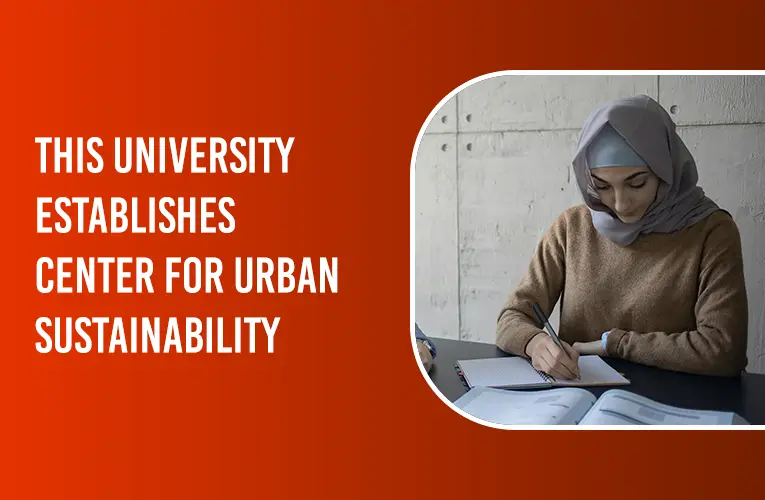THIS UNIVERSITY ESTABLISHES CENTER FOR URBAN SUSTAINABILITY
Introduction
In a landmark move towards fostering sustainable development, [University Name] has announced the establishment of its Center for Urban Sustainability. This initiative is set to play a pivotal role in addressing the pressing environmental challenges facing urban areas worldwide. With a mission to integrate sustainable practices into urban planning and development, the center is expected to become a hub of innovation and research. This article explores the significance of the new center, its objectives, and the potential impact on both the local and global scales.
The Need for Urban Sustainability
Urbanization and Its Challenges
Urbanization has rapidly accelerated over the past century, with more than 55% of the world’s population now living in urban areas. This trend is expected to continue, with projections suggesting that by 2050, nearly 70% of the global population will reside in cities. While urban areas offer numerous economic and social opportunities, they also present significant challenges, including:
- Environmental Degradation: Urban areas are major contributors to air and water pollution, greenhouse gas emissions, and loss of biodiversity.
- Resource Management: The high density of populations in cities strains resources such as water, energy, and food supplies.
- Climate Resilience: Cities are increasingly vulnerable to the impacts of climate change, including extreme weather events and rising sea levels.
To address these issues, it is essential to adopt a holistic approach to urban sustainability that integrates environmental, social, and economic considerations.
The Role of Urban Sustainability Centers
Urban sustainability centers play a crucial role in advancing research, innovation, and policy development aimed at creating more sustainable cities. These centers typically focus on:
- Research and Innovation: Conducting cutting-edge research to develop new technologies and strategies for sustainable urban living.
- Policy Development: Collaborating with policymakers to create and implement regulations and guidelines that promote sustainability.
- Community Engagement: Educating and involving local communities in sustainability efforts to foster grassroots support and participation.
The Establishment of the Center for Urban Sustainability
Objectives and Vision
The newly established Center for Urban Sustainability at [University Name] aims to address the multifaceted challenges of urban living through a range of initiatives:
- Research Excellence: The center will conduct interdisciplinary research on topics such as green infrastructure, sustainable transportation, waste management, and energy efficiency. By leveraging the university’s existing expertise and facilities, the center seeks to generate innovative solutions to urban sustainability challenges.
- Collaborative Partnerships: The center will foster collaborations with governmental bodies, private sector companies, non-governmental organizations (NGOs), and other academic institutions. These partnerships will facilitate the exchange of knowledge and resources, enhancing the impact of the center’s work.
- Educational Programs: Through workshops, seminars, and courses, the center will offer educational opportunities for students, professionals, and the general public. These programs will aim to increase awareness and build capacity in urban sustainability practices.
- Community Outreach: Engaging with local communities will be a key focus of the center. By working closely with residents and local organizations, the center will address specific urban sustainability challenges faced by the community.
Key Features and Facilities
The Center for Urban Sustainability will be equipped with state-of-the-art facilities to support its diverse activities. These may include:
- Research Laboratories: Dedicated spaces for experimental and applied research in areas such as environmental science, engineering, and urban planning.
- Innovation Hubs: Areas designed to foster collaboration and the development of new technologies and solutions.
- Educational Spaces: Classrooms and seminar rooms for delivering educational programs and hosting events.
- Community Engagement Centers: Spaces for workshops, public forums, and interactive exhibits to engage with the community.
Expected Impact and Benefits
Local Impact
The Center for Urban Sustainability is expected to bring numerous benefits to the local community, including:
- Improved Quality of Life: By promoting sustainable practices, the center will contribute to a cleaner, healthier, and more livable urban environment.
- Economic Opportunities: The development and implementation of sustainable technologies and practices can create new job opportunities and stimulate economic growth.
- Enhanced Resilience: The center’s work in climate resilience will help the city better prepare for and adapt to the impacts of climate change.
Global Impact
On a global scale, the center’s contributions to urban sustainability will be significant:
- Advancing Knowledge: The research conducted at the center will contribute to the global body of knowledge on urban sustainability and provide valuable insights for other cities facing similar challenges.
- Influencing Policy: By collaborating with policymakers and sharing best practices, the center can help shape sustainable urban policies at national and international levels.
- Driving Innovation: The center’s focus on innovation will lead to the development of new technologies and solutions that can be applied in cities around the world.
Conclusion
The establishment of the Center for Urban Sustainability at [University Name] represents a crucial step forward in addressing the complex challenges of urbanization. By focusing on research, collaboration, education, and community engagement, the center is poised to make a significant impact on both local and global scales. As cities continue to grow and evolve, initiatives like this one will be essential in ensuring that urban environments remain sustainable, resilient, and thriving.
This new center not only underscores the university’s commitment to addressing pressing environmental issues but also sets a precedent for other institutions to follow. Through its innovative approach and dedication to sustainability, the Center for Urban Sustainability is set to become a beacon of hope and progress in the quest for more sustainable urban futures.










